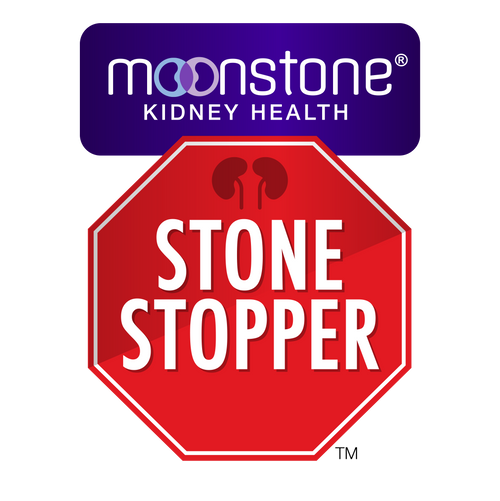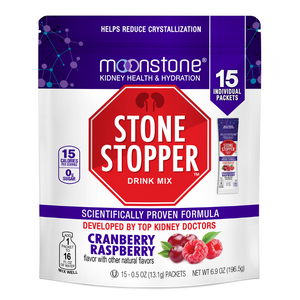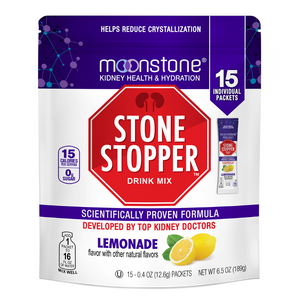Kidney stones are a painful and recurrent issue for many people, but there are effective ways to reduce the risk of their formation. Alkalinizing the urine is crucial for kidney stone prevention. Among the most discussed methods are the use of alkali citrate, baking soda (sodium bicarbonate), and alkaline water to alkalinize the urine. However, not all methods are equally effective or safe. In this blog, we'll explore why alkali citrate stands out as the superior option, particularly when compared to baking soda and alkaline water.
Why Alkalinizing Urine Matters
Kidney stones are formed from substances like calcium oxalate, uric acid, and cystine. For calcium stones, more citrate in the urine prevents calcium from binding to oxalate. Taking alkali citrate supplements will add more citrate to the urine.
Uric acid and cystine stones tend to crystallize in acidic urine. By alkalinizing the urine, these substances are less likely to form crystals, thereby reducing the risk of kidney stone formation. The pH level of urine, a measure of its acidity or alkalinity, plays a pivotal role in this process. Therefore, achieving the right urinary pH through diet or supplements is a key strategy in uric acid and cystine kidney stone prevention.
So whatever kinds of stones one has, citrate supplements are useful. (The only kind of stones that are not helped by citrate supplementation are struvite stones because they are caused by serious urinary tract infections).
The Limitations of Baking Soda (Sodium Bicarbonate)
Baking soda, or sodium bicarbonate, is often used as a home remedy to alkalinize the body. While it can raise urinary pH, its high sodium content poses significant risks, particularly for those concerned about kidney stones.
- High Sodium Content: Sodium intake is closely linked to increased calcium excretion in the urine, which is a risk factor for kidney stone formation. Excess sodium can also elevate blood pressure, leading to further kidney damage. Therefore, while baking soda might temporarily increase urine pH, it could also increase the risk of stone formation due to its sodium content.
- Calcium Excretion: A study conducted in 2023 by Dr. David Goldfarb at NYU Langone revealed that products with low sodium, such as Stone Stopper's alkali citrate, do not cause an increase in calcium excretion, making them a safer and more effective choice for kidney stone prevention compared to sodium-rich alternatives like baking soda.
Alkaline Water: The Overhyped Solution
Alkaline water, with its high pH, has been marketed as a solution for many health issues, including kidney stones. However, the science behind these claims is weak and often misunderstood.
- Misleading pH Impact: While alkaline water has a high pH, this does not necessarily translate to a higher pH in the body or urine. This is because alkaline water is not buffered, so it can have a high urine pH without any of the alkali needed to change blood or urine pH. Blood and urine are both HIGHLY buffered so we don’t get sick from eating acid or alkaline foods (like meat or vegetables respectively). Alkaline water cannot change body acid-base balance.
- Potential Risks: Drinking large amounts of alkaline water can raise the pH of the stomach, potentially impairing digestion and the absorption of essential nutrients like vitamin B12 and protein.
- Lack of Efficacy: A 2024 study conclusively showed that alkaline water does not change urine chemistry in a favorable way to prevent kidney stones. While it may hydrate the body like regular water, it does not offer any additional benefits for kidney stone prevention. If urine chemistry is not changed, then alkaline water is no better for kidney stone prevention than tap water.
The Superiority of Alkali Citrate
Alkali citrate is a natural supplement that offers a dual-action approach to kidney stone prevention: it raises urinary pH and increases urinary citrate levels. This makes it far more effective than baking soda or alkaline water.
- Higher Citrate Concentration: Unlike lemon juice and other citrus fruits, which contain citric acid, alkali citrate provides a higher concentration of citrate, making it more effective at increasing urinary citrate levels. Citrate binds with calcium in the urine, reducing the formation of calcium oxalate crystals, a common component of kidney stones.
- Effective pH Modulation: Alkali citrate effectively raises the pH of urine, making it less acidic and less conducive to the formation of kidney stones. This is a critical advantage over alkaline water, which fails to significantly impact urinary pH.
- Scientifically Proven: Numerous studies have demonstrated the efficacy of alkali citrate in preventing kidney stones. By both increasing urinary citrate and raising urinary pH, alkali citrate creates an environment that is hostile to the formation of kidney stones, significantly reducing the likelihood of recurrence.
- Low Sodium Content: One of the major advantages of alkali citrate, particularly products like Stone Stopper, is their low sodium content. This minimizes the risk of increased calcium excretion and hypertension, making alkali citrate a safer choice for long-term kidney health.
Conclusion
When it comes to alkalizing urine and preventing kidney stones, alkali citrate is the superior choice. While baking soda and alkaline water have been touted for their alkalinizing effects, they fall short in both efficacy and safety. Baking soda's high sodium content poses risks for kidney stone sufferers, while alkaline water cannot raise urinary pH. In contrast, alkali citrate not only increases urinary pH but also boosts urinary citrate levels, offering a proven and reliable method for uric acid, cystine and calcium kidney stone prevention. If you're serious about preventing kidney stones, alkali citrate is the way to go.






1 comment
I have a bad stomach. I’m on a new antacid that is based of potassium. My doctor advised me to drink one glass of the drink that you have, but I find that it is too acidic for my stomach and taking 4 to 6 pills a day is also not doable. Any advice on how to make the drink less acidic for my stomach.??